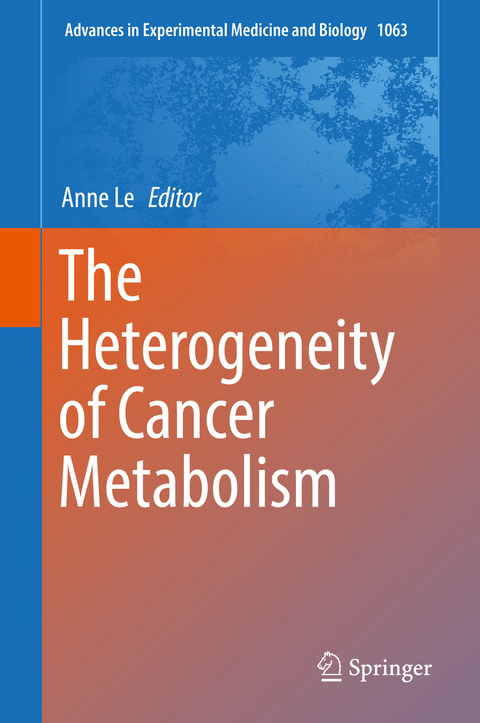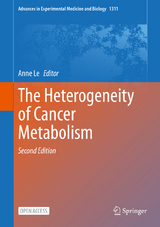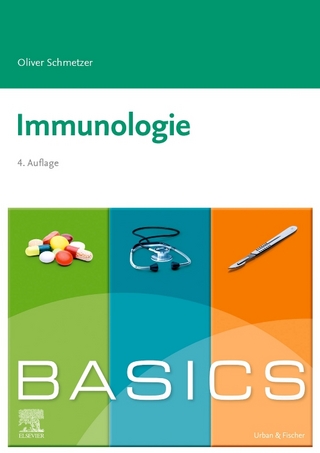
The Heterogeneity of Cancer Metabolism
Springer International Publishing (Verlag)
978-3-319-77735-1 (ISBN)
- Titel erscheint in neuer Auflage
- Artikel merken
In this book, we delve into the complexity and diversity of cancer metabolism, and highlight how understanding the heterogeneity of cancer metabolism is fundamental to the development of effective metabolism-based therapeutic strategies. Deciphering how cancer cells utilize various nutrient resources will enable clinicians and researchers to pair specific chemotherapeutic agents with patients who are most likely to respond with positive outcomes, allowing for more cost-effective and personalized cancer therapeutic strategies.
Anne Le studied at the Paris Descartes University, Cochin Port-Royal School of Medicine, in France where she obtained a Habilitation degree (https://en.wikipedia.org/wiki/Habilitation), the highest academic qualification a scholar can achieve in Europe. After her clinical training at Henri Poincaré University Hospital, Nancy, in France, she started her postdoctoral research fellowship at the Johns Hopkins University School of Medicine in 2007. Since 2011, Dr. Le has been an independent investigator who has yielded a number of contributions to the field of cancer metabolism, demonstrated by her publication record as a pioneer in the field. She has published in the best journals, such as Cell Metabolism and the Proceedings of the National Academy of Sciences of the United States of America. Dr. Le has been invited to present her work at several annual American Association for Cancer Research meetings, the most prestigious international meeting for cancer research scientists and professionals, as well as by the National Cancer Institute, and universities in France, Monaco, Japan, and Taiwan. Research media, such as Science Daily, American Association for the Advancement of Science (AAAS), Business Insider, ALN® Magazine, among many others, have written about her work. Dr. Le is highly respected and sought after for her strong proficiency in judging the work and ideas of her peers. She is regularly invited to serve on review panels by prestigious organizations such as the National Institutes of Health and the US Department of Defense. She is frequently asked by high-cited scientific journals to review manuscripts submitted to their journals.
lt;p>A. The metabolism of cancer cells
I. Glucose metabolism
1. The Warburg Effect
2. Up-regulation of glucose uptake
3. Dysregulation of TCA cycle4. Dysregulation of pentose phosphate pathway
5. Glycogen and gluconeogenesis
5. Targeting glucose metabolism for cancer therapy
II. Glutamine Metabolism
6. Glutamine addiction
7. TCA cycle fed solely by glutamine
8. Reductive carboxylation
9. Targeting glutamine metabolism for cancer therapy
III. Amino acid metabolism
10. Transaminase up-regulation
11. Targeting amino acid synthesis for cancer therapy
IV. Lipid metabolism
12. Dysregulation of lipid metabolism in cancer
13. Targeting lipid metabolism for cancer therapy
V. Epigenetics and oncometabolites
B. Heterogeneity of Cancer Metabolism
I. Specific oncogenic mutations lead to specific metabolic phenotypes within same tissue of origin14. Pancreatic cancer
15. Glioblastomas
16. Renal cell carcinomas
17. Breast cancers
18. Non-Hodgkin's lymphoma
II. Intratumoral heterogeneity of cancer cell metabolism
19. Intratumoral genetic alterations leads to adaptive metabolic heterogeneity20. Different tumor microenvironments lead to different metabolic phenotypes
III. Differential metabolism in vitro and in vivo
C. Carcinoma associated fibroblasts (CAFs)
21. Characteristics of CAFs
22. Reverse Warburg effect
23. Metabolic exchange between CAFs and cancer cells
| Erscheinungsdatum | 03.07.2018 |
|---|---|
| Reihe/Serie | Advances in Experimental Medicine and Biology ; 1063 |
| Zusatzinfo | XV, 183 p. 31 illus. in color. |
| Verlagsort | Cham |
| Sprache | englisch |
| Maße | 155 x 235 mm |
| Gewicht | 457 g |
| Themenwelt | Medizin / Pharmazie ► Medizinische Fachgebiete ► Onkologie |
| Studium ► Querschnittsbereiche ► Infektiologie / Immunologie | |
| Schlagworte | Amino Acid Metabolism • Cancer cell metabolism • epigenetics and oncometabolites • Glucose metabolism • Glutamine Metabolism • Lipid metabolism |
| ISBN-10 | 3-319-77735-1 / 3319777351 |
| ISBN-13 | 978-3-319-77735-1 / 9783319777351 |
| Zustand | Neuware |
| Haben Sie eine Frage zum Produkt? |
aus dem Bereich



